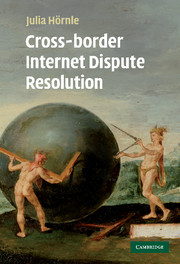Book contents
- Frontmatter
- Contents
- List of illustrations
- List of tables
- Table of cases
- Table of UK statutes
- Table of UK statutory instruments
- Table of European Communities legislation and documents
- Table of foreign statutes
- Table of treaties and conventions
- Acknowledgements
- List of abbreviations
- 1 Introduction
- 2 The concepts of fairness
- 3 Internet disputes
- 4 ADR and applicable law
- 5 ODR and access
- 6 Arbitration and due process
- 7 Internet disputes and fair arbitration
- 8 A model of dispute resolution for the Internet
- Bibliography
- Index
- References
4 - ADR and applicable law
Published online by Cambridge University Press: 30 November 2009
- Frontmatter
- Contents
- List of illustrations
- List of tables
- Table of cases
- Table of UK statutes
- Table of UK statutory instruments
- Table of European Communities legislation and documents
- Table of foreign statutes
- Table of treaties and conventions
- Acknowledgements
- List of abbreviations
- 1 Introduction
- 2 The concepts of fairness
- 3 Internet disputes
- 4 ADR and applicable law
- 5 ODR and access
- 6 Arbitration and due process
- 7 Internet disputes and fair arbitration
- 8 A model of dispute resolution for the Internet
- Bibliography
- Index
- References
Summary
Those, who in quarrels interpose,
Must often wipe a bloody nose.
(John Gay, 1685–1732)Introduction
The function of this chapter is to explain the meaning of alternative dispute resolution (ADR). This serves as background to the discussion of ODR in the following chapter. This chapter concentrates on the two main forms of ADR (mediation and arbitration), discussing their main characteristics, function and limitations. In doing so, this chapter explains why only arbitration is to be regarded as a true alternative to litigation, and why mediation is, in its nature, a sort of filter for disputes, a complementary rather than independent form of dispute resolution.
One way to deal with disputes is through adjudication. The essence of adjudication is to have a neutral third person decide whether the second person should give the disputed something to the first person or do what the first person demands. The adjudicator thereby defines the first person's legal rights and entitlements.
Alternatively, the first person may want to bargain with the other person. Bargaining by its very nature involves the first person persuading the second person that it is in his or her interests to give to the first person what they wish to obtain, or to do what the first person wants him or her to do.
Between the opposite ends of the spectrum of formality (namely bargaining and litigation) lies a range of dispute resolution mechanisms that involve a neutral third party but which are kept outside the courts.
- Type
- Chapter
- Information
- Cross-border Internet Dispute Resolution , pp. 47 - 73Publisher: Cambridge University PressPrint publication year: 2009



